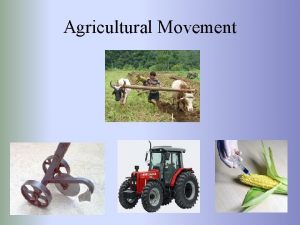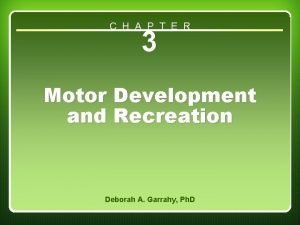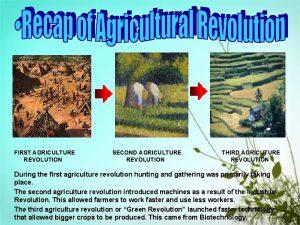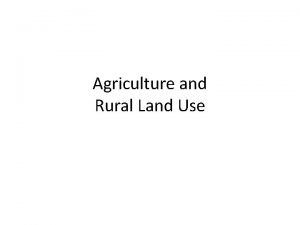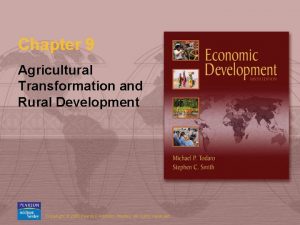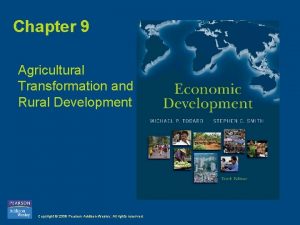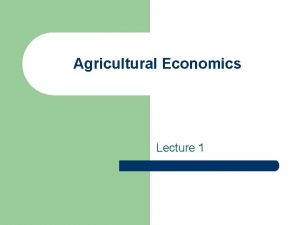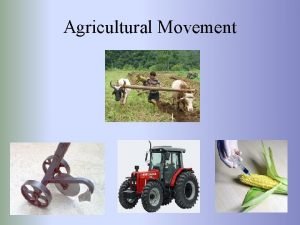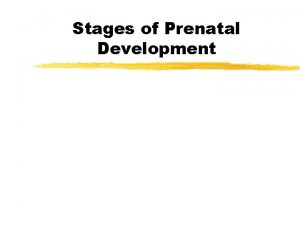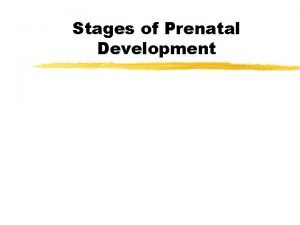Agricultural Movement Stages of Agricultural Development First Agricultural









- Slides: 9

Agricultural Movement

Stages of Agricultural Development First Agricultural Revolution creation of farming (hunting gathering to farming) Invention of the plough Second Agricultural Revolution Intensive vs. extensive cropping systems. The introduction of steam powered tractors, diffusion of crop types, fertilizers, specialization (1600 -1870 s) Green Revolution Development of High Yield Varieties (wheat) (1945 – 1970) Second Green Revolution Biotechnology, GMOs, agribusiness, corporations, globalization. (1990 - present date)

Agriculture Definitions Agricultural activities can be classified in TWO ways. The first (A) can classify farming as either Subsistence or Cash-Cropping: A 1. Subsistence Farming – Farmers that grow crops and raise livestock for their own use. Grow enough to keep them and their families alive. A 2. Cash-Crop Farming – Farmers that grow a surplus and sell on the open or world market. Farm for a living.

Agriculture Definitions The second way (B) classifies farming as either Intensive or Extensive farming: B 1. Intensive Farming: involves farming on small amounts of land. The farming is concentrated and labour intensive as well as technology. Growing fruits and vegetables, vineyards, and livestock in Canada is an example. B 2. Extensive Farming: involves large amounts of land with limited amounts of labour. Machines do most of the work. Grain farming in Western Canada is a good example. Ranching is also considered extensive farming

Agriculture Definitions Low level of agricultural technology Some countries in the developing world are still using traditional farming methods. Some (Northern Africa) even use the old Hunting and Gathering technique This method is primitive, time consuming, unreliable, there is no storage involved and it is greatly susceptible to climate. Some countries use a method called Shifting Cultivation or Slash and Burn http: //video. answers. com/slash-and-burn-agriculture-in-peru-477575508

The production of food depends on the following factors

Food Production The production of food depends on the following factors 1) Environmental – climate, soils, topography 2) Technological - irrigation, fertilizer: pesticides (insects), herbicides (weeds) and storage of food 3) Economical/Political – pricing, trade, export/import, tariffs, subsidies, distribution, taxes etc.

Food Production The Factors Required: Environmental Climate • Solar energy or heat requirement. – This is measured by the length of the ‘Growing Season’ (the number of months over 5. 50 C. ) • Moisture requirement. – This is measured in the amount of Precipitation. – Evapotranspiration. This is the movement of water from the soil into the atmosphere by evaporation from the soil and transpiration from plants. Topography - Flat land is best for uniform crop growth. The Banaue Rice Terraces http: //www. youtube. com/watch? v=h. NSYta. HIh. R 8

Food Production The Factors Required: Environmental Soil Fertility • Soil is a complex substance that includes minerals, living and decaying organic materials, water and air. • The amount of decaying organic material (Humus) is the most important – determines the soil’s fertility. • Organisms are highly beneficial for farming. Earthworms are needed for soil aeration and bees of course for pollination. • Poor agricultural practices such as excessive cultivation of the land leads to unproductive soil.
 Stages of agriculture
Stages of agriculture Movement area
Movement area What are the 7 axial movements
What are the 7 axial movements Specialised application phase
Specialised application phase Agricultural revolution
Agricultural revolution Commercialization ap human geography
Commercialization ap human geography The second agricultural revolution
The second agricultural revolution Chapter 9 agricultural transformation and rural development
Chapter 9 agricultural transformation and rural development Chapter 9 agricultural transformation and rural development
Chapter 9 agricultural transformation and rural development What is agricultural development
What is agricultural development
